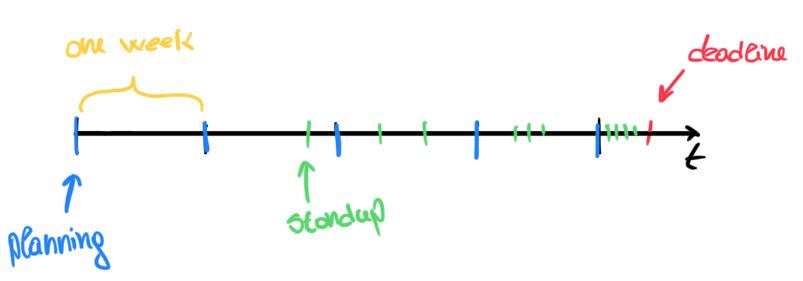One of my earliest memories of my first year a the university was the myth of software development. The influence of movies, books, and articles about how working in software was different than any other job, created the excitement of what was coming after graduating: working back to back with each other, discussing the schedule, and planning each sprint. One activity fascinated me the most: daily stand-ups. A 15-minute long moment that brings the team together to learn what everyone is working on.

When I didn’t have any experience with working in a team, I created expectations as to when I would join my first. Coming from university projects, I thought that a team had to work on a single project, otherwise, it is not a team.
When I joined my first company, the reality was very different, and I started to rethink whether or not daily stand-ups were useful. After some years in the industry, I can say that most of them are not.
As a developer, I like writing code and meetings (of any form, even stand-ups) are a kind of interruption. Interruptions are not useless when they add value to work, like defining new tasks, collecting feedback and reviewing progress. When you don’t get (or even perceive) any value from the meeting, that’s a waste of productivity for you and the team.
I kept track of the daily stand-ups I took part of and found out that some conditions make the stand-up meaningful:
- it is done with people I am working with;
- it is done only when sync is needed.
I think I can easily drop the “daily” in “daily stand-up” and only think of “stand-up”. This kind of team sync should not be done with the entire team, as people end up not listening to what other team members have to say because it is not in their interest. Should a back-end developer be interested in what colour a button will be? Should a team member working on project A be interested in project B? If it does not affect their work, then… no.
This is my point of view as a developer, but I can think about other reasons why as a team leader I could be interested in hearing what everyone in the team is doing and check how the project is doing. It may be the reason why some people prefer to have a daily stand-up with all the team to keep track of their work. Still, I think that if you need to check each day on your teamwork, then there’s something wrong with the way you manage your team.
Collaborative tools like Trello, Notion and Jira are enough to keep track of tasks and people and make it easy to visualise anything blocked. Therefore, doing a sort of daily check-in is not helpful and should either be done privately (via Slack, email, or whatever non-blocking) or not be done at all.
Hence, when is sync needed? It depends on the status of the project. Syncs between project members become critical when each task is more and more closely related to other people’s work. The end of a project is where everything is put together and people start to conclude the work done in the past weeks.

But if you are not in charge of organising the workflow and you have to take part in meetings, even if you think that they are not useful, my great advice is to always take the most value out of it. Caring too much about practical coding is a bad signal to give off, as is falling from the sky when it is your time to speak. By listing to other devs, stakeholders or members of other teams, you can always learn something new. Moreover, don’t forget that you often share the same objectives and having the opportunity to listen to other opinions is great.
Speaking of opinions, thank you for taking the time to read mine! As always, you can reach me on Twitter to comment. I would love to hear from you 🌞